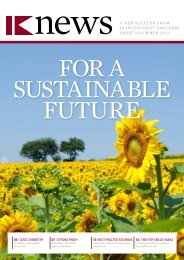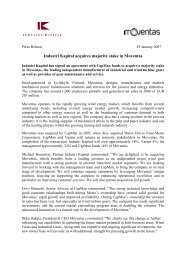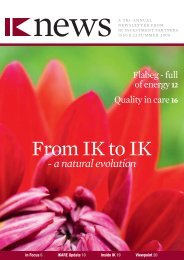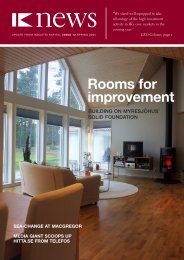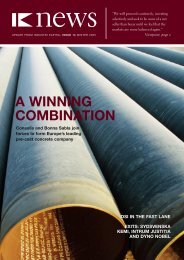Download IK News - IK Investment Partners
Download IK News - IK Investment Partners
Download IK News - IK Investment Partners
Create successful ePaper yourself
Turn your PDF publications into a flip-book with our unique Google optimized e-Paper software.
news<br />
INDUSTRI KAPITAL<br />
:ISSUE NO 4 SUMMER 2002
:IPO MARKETS RETURNING<br />
– and better times ahead for<br />
TO NORMAL public market investors<br />
FEW SECTORS OF INTERNATIONAL finance<br />
have been affected as adversely by the global<br />
economic slowdown, the aftermath of 11<br />
September and the fallout from the collapse of<br />
Enron, the US energy giant, as the market for<br />
new equity issues.<br />
Last year the global IPO market was worth<br />
$85 billion – less than half the $196 billion it<br />
totalled in 2000. This year it is estimated that<br />
volumes will be more in line with 2001 than<br />
with the previous year.<br />
Such arid conditions are detrimental both to<br />
investors and to those companies seeking to<br />
raise new money in the primary equity markets.<br />
Investors need regular opportunities to put<br />
their money into a variety of companies, in a<br />
range of sectors, if they are to adequately spread<br />
their risk. Companies, in turn, need reliable<br />
access to as many sources of capital as possible.<br />
Over the last 12 months, however, conditions<br />
for new issues in the primary equity markets<br />
have been poor, with investor confidence at a<br />
markedly low ebb. Stock markets world-wide<br />
have been effectively closed to all but the most<br />
stunning of debutantes and even these issues<br />
have had to be priced at the low end of<br />
expectations.<br />
With the absence of an IPO route private<br />
equity-backed companies have been turning<br />
to trade sales or secondary buyouts as their<br />
preferred exit routes. Last year <strong>IK</strong> alone<br />
achieved four healthy realisations via trade sales.<br />
In better days some of these companies might<br />
have listed. Private equity houses are nothing if<br />
not resourceful and will achieve the right exits<br />
for their investments, come what may. But for<br />
public market investors it is a different story and<br />
they have been deprived of what might have<br />
been attractive investment opportunities.<br />
Fortunately the tide seems to be turning and<br />
in the recent period the supply and demand for<br />
capital has begun to swing slowly into balance.<br />
This year has already seen a number of<br />
private equity-backed companies – including<br />
<strong>IK</strong>’s Alfa Laval, Nobia and Intrum Justitia –<br />
being floated. Although the pricing on some<br />
of these issues has been sensitive, a trail has<br />
been blazed and the backlog of companies that<br />
were stranded on the slip-way last year can now<br />
begin to clear.<br />
However,<br />
there have been<br />
lessons to be<br />
learnt on both<br />
sides. All IPO<br />
participants must be realistic about what they<br />
can achieve from the situation. Institutions<br />
cannot expect IPOs to be discounted to the<br />
extent that companies are significantly undersold.<br />
Vendors and their advisors, in turn, must ensure<br />
that the share price is not so toppish that it sinks<br />
as soon as trading begins. Vendors should also<br />
retain a meaningful portion of shares so as to<br />
demonstrate a vested interest in their company’s<br />
continuing success as a quoted concern.<br />
The last year or so has been a difficult time<br />
for aspirant stock market joinees, their vendors,<br />
sponsors and prospective investors. IPOs are<br />
not for the faint-hearted and will always be<br />
something of an educated gamble. Nevertheless,<br />
a smoothing of the peaks and troughs that have<br />
“After a difficult year for aspirant stock market joinees, their<br />
vendors, sponsors and prospective investors, it seems that supply<br />
and demand for capital has begun to swing slowly into balance.”<br />
come to characterise stock market listing and<br />
investing would be desirable with markets<br />
‘well-functioning’ for a greater part of the<br />
business cycle, rather than in boom times<br />
only. This has, however, become more difficult<br />
with many hedge funds stagging and shorting<br />
new IPOs.<br />
Increased stock market stability would<br />
benefit companies through providing a reliable<br />
means of realising and raising new capital. It<br />
would also enable investors to judge companies<br />
on their individual merits and not see their<br />
market value influenced so unduly by factors<br />
outside their control.<br />
Björn Savén, Chief Executive
:SUCCESSFUL FLOTATION<br />
OF ALFA LAVAL<br />
A text book example of a model<br />
investment for Industri Kapital<br />
LESS THAN TWO YEARS after one of Europe’s<br />
largest LBOs, Alfa Laval has been restructured,<br />
revitalised and floated successfully on the<br />
Stockholm Exchange.<br />
The flotation of Alfa Laval, the Swedish<br />
specialised process engineering company, on the<br />
Stockholm Exchange in May this year, was a<br />
text book example of what has been a model<br />
investment for Industri Kapital.<br />
As one of the best known and most wellrespected<br />
names in the engineering sector, Alfa<br />
Laval has strong technology and a global<br />
presence serving niche markets. The company<br />
has global leading positions in each of its three<br />
main activities – heat transfer, separation and<br />
fluid handling – employs over 9,200 people and<br />
has sales and manufacturing facilities worldwide.<br />
Alfa Laval was founded in 1883 to produce<br />
and sell dairy cream separators. It was listed<br />
for most of its history until 1991 when it was<br />
acquired by the privately owned international<br />
food and packaging group Tetra Pak.<br />
Following the acquisition, the new group’s<br />
organisation was gradually restructured and in<br />
1993 the company took the name Tetra Laval<br />
Group. Tetra Laval set about absorbing Alfa<br />
Laval’s food and agricultural businesses and<br />
disposed of peripheral activities. By 1999,<br />
however, Tetra Laval had decided to refocus<br />
around its core food-related business and Alfa<br />
Laval was put up for sale.<br />
Offers were invited from a number of financial<br />
and trade buyers. Initially Industri Kapital did<br />
not qualify for the second round of the auction<br />
sale. But when other, higher bids began to fall<br />
away <strong>IK</strong> was re-invited into the auction process.<br />
Its negotiations were successful and on 24<br />
August 2000 <strong>IK</strong> acquired a 62.2 per cent stake in<br />
Alfa Laval. Tetra Laval retained a minority<br />
interest of 36.8 per cent with management<br />
owning the remaining 1.0 per cent of the equity.<br />
Ingredients for success<br />
“We believe that we valued the company fairly,<br />
but appreciated that despite its relatively modest<br />
profitability it was an absolutely world class<br />
company – technically and in terms of its<br />
customer base. With strong market positions,<br />
FLUID HANDLING. One of<br />
Alfa Laval’s key technologies.<br />
good cash flow and proven international<br />
management Alfa Laval had all the ingredients<br />
for success,” says Christian Salamon, a Director<br />
of <strong>IK</strong>, who led the transaction team.<br />
With vendor participation a feature in the<br />
majority of its investments, <strong>IK</strong> was happy for<br />
Tetra Laval to maintain a stake in the company.<br />
“These arrangements usually work well both<br />
ways. We have comfort that the company hasn’t<br />
been ‘dressed-up’ for sale while the vendor<br />
knows that it will share in the company’s upside<br />
and isn’t selling itself short,” says <strong>IK</strong> Associate<br />
Director Hans-Christian Bødker Jensen.<br />
Jörn Rausing, head of M&A and board<br />
member of Tetra Laval explains that, initially,<br />
maintaining a stake in Alfa Laval was regarded<br />
as something of a contingency plan by Tetra<br />
Laval. “We were not immediately comfortable<br />
with the idea. But when we understood how<br />
clear <strong>IK</strong>’s objectives were – in terms of staying<br />
true to the bottom line and maximising<br />
profitability, and became attuned to the fact that<br />
our role in the company had shifted from being<br />
a strategic to a financial partner, we saw that it<br />
could work to everyone’s advantage,” he says.<br />
Alfa Laval’s management team, led by<br />
President and Chief Executive Sigge Haraldsson,<br />
was also pleased with the outcome. “From the<br />
outset <strong>IK</strong> took a dedicated interest in Alfa Laval,<br />
the values inside the company and the potential<br />
for further value creation,” he says. “<strong>IK</strong> swiftly<br />
aligned its interests with those of the company<br />
and the management team and the relationship<br />
between us all – management, <strong>IK</strong>, and Tetra<br />
Laval – has always been very positive,”<br />
Haraldsson continues.<br />
“Having now packed a great deal into a short,<br />
and hectic, time-frame, we have lived very close<br />
to some key people at <strong>IK</strong> and feel we know<br />
them very well. The partnership has been very<br />
strong,” he says.<br />
Classic turn-around material<br />
With its global market leading positions and<br />
financial improvement potential Alfa Laval was<br />
an attractive investment proposition for <strong>IK</strong>. It<br />
was also well diversified in terms of its customer<br />
base, end-user industries and geographically.<br />
“It was a very stable business with a recognised<br />
global brand name in markets with significant<br />
barriers to entry,” notes Salamon.<br />
With many of Alfa Laval’s products critical<br />
to its customers’ manufacturing processes the<br />
company also has a large base of installed<br />
products producing recurring profitable sales<br />
of parts and services.<br />
Because it enjoyed gross margins of some 35<br />
per cent yet had operating profits which, at 6.5<br />
per cent, were well below the industry average,<br />
Alfa Laval was regarded as classic turn-around<br />
material. “We could see strong potential for<br />
improving the company’s operating efficiency,”<br />
says Hans-Christian Bødker Jensen.<br />
A multi-year restructuring strategy to achieve<br />
this, primarily through reducing Alfa Laval’s cost<br />
base together with the sale of real estate and<br />
under-performing assets was launched. The<br />
results were showing through as early as 2001
A STRATEGIC PARTNERSHIP.<br />
Christian Salamon and Hans-Christian<br />
Bødker Jensen, members of <strong>IK</strong>'s Alfa<br />
Laval team. Sigge Haraldsson, Chief<br />
Executive, Alfa Laval.<br />
with nearly half the SEK 1 billion of savings<br />
annually, which had been targeted for the end<br />
of 2003, being delivered.<br />
Parallel initiatives to enhance top line<br />
growth, continue margin expansion and grow<br />
shareholder value included focusing increasingly<br />
on individual customer segments, expanding<br />
Alfa Laval’s after-market sales of parts and services,<br />
developing new industry applications and<br />
products as well as making add-on acquisitions<br />
and strategic alliances.<br />
Right time to enter next phase<br />
<strong>IK</strong>’s experience with other companies in its<br />
portfolio in similar circumstances provided<br />
valuable insights here. <strong>IK</strong> had already employed<br />
a strategy to boost the after-market side of<br />
Finland’s KCI Konecranes, for example. And<br />
Alfa Laval was exposed to several industry<br />
segments, which <strong>IK</strong> was comfortable with<br />
through previous investments, e.g. the marine<br />
segment through the marine cargo handling<br />
equipment company MacGregor.<br />
“The process to restructure and build a new<br />
company has been huge. But <strong>IK</strong> was always<br />
growth with ‘liquid currency’ to help fuel that<br />
growth,” Salamon asserts.<br />
In addition, although the restructuring<br />
programme has been a success and resulted in<br />
almost doubled operating profit (adjusted<br />
EBITA) between 1999 and 2001, Alfa Laval was<br />
still not the best in its class – its comparable<br />
peer group having EBITA margins of 14-15 per<br />
cent against Alfa Laval’s 11 per cent EBITA in<br />
2001. “We hadn’t reaped all the benefits of the<br />
improvements ourselves but had left something<br />
on the table for the new investors,” Salamon<br />
explains.<br />
Nervous equity markets<br />
Although Alfa Laval is a global business it was<br />
decided to float the business on the Stockholm<br />
Exchange primarily because the company has<br />
strong brand recognition in Sweden and this is<br />
where it has its roots and had been listed<br />
previously.<br />
Following a ‘beauty parade’, Credit Suisse<br />
First Boston and Enskilda Securities were<br />
appointed in early spring 2002 as joint global coordinators<br />
and book runners<br />
“The last two years has been an interesting and rewarding for the IPO. In addition<br />
Deutsche Bank, Lehman<br />
journey. The fact that we were able to list on the stock<br />
Brothers, ABN AMRO<br />
market after less than two years under new ownership is Rotschild Alfred Berg,<br />
Handelsbanken Securities<br />
the most conclusive evidence of our success.”<br />
and Nordea Securities were<br />
appointed co-lead managers.<br />
extremely supportive of the transformation strategy The lead banks carried out a pre-marketing<br />
and the suggestions and initiatives taken by the exercise among more than 300 institutions to<br />
management team,” says Sigge Haraldsson. get a feeling for the company’s valuation and<br />
Alfa Laval achieved annual net sales of some likely pricing.<br />
SEK 16 billion and EBITA of approximately<br />
However, the primary equity markets were<br />
SEK 1.7 billion in late 2001. With all the<br />
still nervous. A series of other events such as the<br />
cost-saving and value creation initiatives<br />
announcement of an ambitious rights issue by<br />
performing well ahead of plan, an exit strategy the Swedish telecom giant Ericsson, the decision<br />
was formulated.<br />
by LM Glasfiber in Denmark to cancel its<br />
“We had initially put a three to five year time flotation and that by Punch Taverns to postpone<br />
horizon on the investment. This was governed its float in the UK where retail group HMV had<br />
by the time expected for all the restructuring already displayed poor trading performance<br />
changes to be implemented. But since we had post-float, further sapped investor confidence.<br />
already had some very good results coming<br />
“Although there was a lot of investor interest<br />
through relatively early we felt it was a good in Alfa Laval there was also a great deal of<br />
time for Alfa Laval to enter the next phase of its uncertainty in the IPO markets,” says Salamon.<br />
“This uncertainty grew during the book<br />
building process and investors became very<br />
price sensitive,” he says.<br />
Significantly oversubscribed<br />
Having listened to the market, <strong>IK</strong> decided to<br />
revise the share price downwards and also to sell<br />
fewer shares rather than postpone the float. At<br />
SEK 91 per share, against an earlier indicated<br />
range of SEK 108 to SEK 140, Alfa Laval had<br />
ultimately a market capitalisation just over SEK<br />
10 billion (EUR 1.7 billion).<br />
<strong>IK</strong> and Tetra Laval retained 27 per cent<br />
and 16 per cent of the newly-listed company,<br />
respectively. Ultimately, however, the share<br />
issue was three-and-a-half times subscribed with<br />
the share price rising by nearly eight per cent on<br />
the first day of trading.<br />
“A stock market listing was always our<br />
preferred exit route and also supported by the<br />
management team. It was a relatively smooth<br />
process and the outcome has been very good,”<br />
continues Salamon.<br />
“The last two years have been an interesting<br />
and rewarding journey and the fact that we were<br />
able to list on the stock market after less than<br />
two years under new ownership is the most<br />
conclusive evidence of our success,” Sigge<br />
Haraldsson concludes.<br />
Operating profit (MSEK)*<br />
2,000<br />
1,500<br />
1,000<br />
500<br />
0<br />
* Adjusted EBITA<br />
6.5%<br />
934<br />
7.7%<br />
11,0%<br />
1,160 1,738<br />
1999 2000 2001<br />
SIGNIFICANT IMPROVEMENT. The<br />
restructuring programme resulted in<br />
almost doubled operating profit between<br />
1999 and 2001.<br />
Operating margin<br />
15%<br />
12%<br />
9%<br />
6%<br />
3%<br />
0%
:PORTFOLIO COMPANY NEWS<br />
SUCCESSFUL IPO OF<br />
INTRUM JUSTITIA<br />
Receivables management service<br />
company Intrum Justitia was<br />
listed on the Stockholm Exchange<br />
on 7 June 2002 following an Initial<br />
Public Offering of shares to the<br />
market. The price was set at SEK<br />
47 per share. As a result, Intrum<br />
Justitia received net proceeds of<br />
SEK 1,350 million. Following the<br />
IPO the Industri Kapital 1997<br />
Fund owns approximately 25 per<br />
cent of the company.<br />
“The great interest shown in<br />
Intrum Justitia during the IPO<br />
process, and the fact that the<br />
offer was subscribed 12 times,<br />
demonstrates great confidence in<br />
the company’s business. The<br />
demand for professional services<br />
NOBIA LISTS ON THE<br />
STOCKHOLM EXCHANGE<br />
The Industri Kapital 1994 Fund<br />
company. We have built a strong<br />
platform from which we expect to<br />
grow further both organically and<br />
EUR 1 billion and some 6,000<br />
employees. The group’s brands<br />
include Poggenpohl, Magnet,<br />
companies driven by the out-<br />
has made a partial exit through<br />
through synergistic acquisitions.<br />
HTH, Marbodal, Norema, Sigdal<br />
sourcing trend has proven high,”<br />
the IPO of Nobia. The offering<br />
The listing provides us with<br />
and Novart.<br />
commented Christian Salamon,<br />
was subscribed approximately<br />
continued strength to do so,”<br />
“It has been an exciting journey<br />
a Director of Industri Kapital.<br />
3 times and the price was set<br />
commented Nobia’s CEO, Fredrik<br />
since 1996 when we founded<br />
Intrum Justitia’s objective<br />
at SEK 78 per share. The new<br />
Cappelen.<br />
Nobia. The business has been<br />
is to be the leading provider of<br />
issue provided Nobia with gross<br />
The Industri Kapital 1994 Fund<br />
radically redefined through<br />
receivables management services<br />
proceeds of approximately<br />
owns approximately 38 per cent<br />
extensive restructuring, brand<br />
in Europe by measurably improving<br />
SEK 546 million. Trading in<br />
of Nobia following the IPO (prior<br />
development, organisational<br />
clients’ cash flow and long-term<br />
Nobia shares on the Stockholm<br />
to any utilisation of the over-<br />
re-engineering and add-on<br />
profitability. The group has a turn-<br />
Exchange commenced on 19<br />
allotment option).<br />
acquisitions. The company is<br />
over of SEK 2.3 billion with more<br />
June 2002.<br />
Nobia is Europe’s leading<br />
well positioned for further growth<br />
than 2,600 employees in 21<br />
“Nobia has developed into<br />
kitchen interiors company with<br />
as a listed company,” comments<br />
European countries.<br />
Europe's largest kitchen interiors<br />
pro forma sales of approximately<br />
<strong>IK</strong>’s Chief Executive Björn Savén.<br />
:TRANSACTIONS<br />
Ulm, Germany, had sales in<br />
excess of EUR 390 million in 2001<br />
and employs approximately<br />
INDUSTRI KAPITAL ACQUIRED<br />
LABEYRIE GROUP<br />
Industri Kapital has strengthened<br />
support Labeyrie’s strategy of<br />
acquisition-led growth in its main<br />
businesses, both in France and<br />
2,900 people globally.<br />
its position in the French buyout<br />
abroad,” said Christopher Masek,<br />
“We see a great potential for<br />
market through the acquisition of<br />
a Director in <strong>IK</strong>’s Latin European<br />
the business to grow organically<br />
Labeyrie Group. The company<br />
team. “Together with Labeyrie’s<br />
and through selected additional<br />
was acquired from Groupe Suez<br />
management we aim to further<br />
investments and we are prepared<br />
and through a public offering. This<br />
develop the business, for example<br />
to support Gardena’s strategy to<br />
was <strong>IK</strong>’s third investment in<br />
through broadening the product<br />
expand in Europe,” said Detlef<br />
France, the two prior transactions<br />
range and creating new<br />
Dinsel, the Director responsible<br />
being Fives-Lille in 2001 and Laho<br />
distribution channels.”<br />
for <strong>IK</strong>’s German operations.<br />
Equipement in 2000.<br />
Gardena – both a brand and<br />
Labeyrie Group is the<br />
GARDENA ACQUISITION<br />
COMPLETED<br />
The <strong>IK</strong> 2000 Fund has completed<br />
company name – is inseparably<br />
linked with gardens and gardening.<br />
The company started its<br />
operations in 1961 and is today<br />
European market leader in foie<br />
gras and smoked salmon. All its<br />
products are produced according<br />
to high gastronomical standards<br />
the acquisition of Gardena<br />
active in over 80 countries around<br />
in the southwestern part of<br />
Holding AG from the founding<br />
the world. Gardena offers a<br />
France.<br />
families and through a public<br />
comprehensive range of garden<br />
The company’s turnover for<br />
tender offer.<br />
products including water manage-<br />
the financial year 2000-2001<br />
Gardena is a leading European<br />
ment, garden care as well as<br />
exceeded EUR 200 million and it<br />
garden equipment company. The<br />
pumps and garden decoration<br />
has some 2,500 employees.<br />
group which is headquartered in<br />
throughout the world.<br />
“Industri Kapital intends to
:PERSONNEL<br />
:KNOWLEDGE DEVELOPMENT<br />
NEW RECRUITS<br />
MAY INVESTOR MEETINGS<br />
<strong>IK</strong>’s New York and London<br />
gatherings are planned<br />
for the London and Hamburg<br />
encounters along the way.<br />
Demonstrating high levels of<br />
investor meetings took place in<br />
investment professionals later<br />
entrepreneurship, good team<br />
Anders Petersson<br />
May and numbered around 90<br />
this year.<br />
spirit and masses of free and<br />
Swedish. Associate,<br />
participants in total. The two<br />
innovative thinking all teams<br />
German team.<br />
meetings had the same agendas.<br />
During March all <strong>IK</strong> assistants<br />
found their way to the gathering<br />
Based in Hamburg.<br />
Björn Savén kicked off the<br />
gathered together for a day<br />
spot and winners were crowned<br />
meetings with opening remarks<br />
structured around working in<br />
– not all undisputed!<br />
about <strong>IK</strong>’s organisation and<br />
projects. Practical examples<br />
James Yates<br />
current activities, followed by<br />
were mixed with lectures and<br />
Throughout spring training of staff<br />
British. Manager,<br />
Harvard professor Paul A.<br />
interactive sessions around<br />
on all functions of top<strong>IK</strong> – the <strong>IK</strong><br />
<strong>Investment</strong> Administration.<br />
Gompers who gave a presentation<br />
different angles of the theme.<br />
Intranet – has continued and<br />
Based in London.<br />
on “The Opportunity for Private<br />
several Super-users of different<br />
Equity in Europe”. The <strong>IK</strong><br />
During April the annual <strong>IK</strong> Spring<br />
modules have been appointed in<br />
Directors thereafter discussed<br />
Summit took place in Divonne,<br />
the different offices to help share<br />
Bruce Costick<br />
recent transactions and portfolio<br />
France starting with workshops<br />
knowledge – knowledge sharing<br />
British. Senior Accountant.<br />
developments. Dag Mejdell, CEO<br />
for all investment professionals<br />
is power bearing!<br />
Based in London.<br />
of Dyno Nobel ASA, rounded off<br />
around three main themes: “Lead<br />
the meetings with an in-depth<br />
sourcing or How do you make the<br />
description of Dyno Nobel and its<br />
cold call and get the meeting”,<br />
Ola Cronholm<br />
activities. Both meetings were<br />
“Price Mechanism or How do you<br />
Swedish. Controller,<br />
followed by dinner.<br />
make sure you actually pay what<br />
<strong>Investment</strong> Administration.<br />
Based in London.<br />
KNOWLEDGE SHARING IS<br />
POWER BEARING<br />
Knowledge sharing and training<br />
you set out to do” and “Investing<br />
in partnership with Management<br />
– what does it REALLY mean”<br />
Many ideas were exchanged in<br />
Caspar von Meibom<br />
for various groups of <strong>IK</strong> staff<br />
good spirits, many new thoughts<br />
German. Associate,<br />
continued in different formats<br />
were evoked, tested and filed.<br />
German team.<br />
during spring. The activities started<br />
When the rest of the <strong>IK</strong> staff<br />
Based in Hamburg.<br />
off in February when the Stockholm<br />
joined the investment teams,<br />
investment professionals were<br />
information on current projects<br />
given a chance to sit down with<br />
was shared. The get-together was<br />
Trygve Grindheim<br />
experts from the legal as well as<br />
rounded off by sending everybody<br />
Norwegian. Has rejoined<br />
audit side to discuss Corporate<br />
trekking into the mountains,<br />
Industri Kapital in London<br />
Governance both in theory and<br />
equipped with list of to dos, to<br />
as Deputy Director.<br />
real life situations. Similar<br />
finds and problem-solving<br />
:WEB LINKS<br />
:CALENDAR<br />
www.alfalaval.com<br />
www.labeyrie.com<br />
DURING SEPTEMBER<br />
<strong>IK</strong> <strong>News</strong><br />
DURING DECEMBER<br />
Annual Update<br />
www.gardena.com<br />
www.industrikapital.com<br />
www.nobia.com<br />
www.stockholmsborsen.se<br />
3 DECEMBER<br />
Annual Investor Meeting<br />
BY END DECEMBER<br />
30 September, 2002 Reports,<br />
Stockholm<br />
including Valuations<br />
www.intrum.com<br />
Advisory Council Meeting<br />
distributed to Investors<br />
Stockholm<br />
www.industrikapital.com<br />
<strong>IK</strong> <strong>News</strong> is published three times a year by Industri Kapital Limited, Brettenham House, 5 Lancaster Place, London WC2E 7EN, England.<br />
© 2002 Industri Kapital Limited. All rights reserved. Neither this publication nor any part of it may be reproduced, stored in a retrieval<br />
system, or transmitted in any form or by any means, electronic, mechanical, photocopying, recording or otherwise, without the prior<br />
permission of Industri Kapital Limited. Editor: Anne Holm Rannaleet. Assistant editor: Maria Nilsson. Copy: Joanna Gant.<br />
Illustrations: Bo Lundberg/Rithuset. Photographer: Antti Mannermaa. Production: Åkesson & Curry KB, Sveavägen 62, SE-111 34<br />
Stockholm, www.akessoncurry.com.



